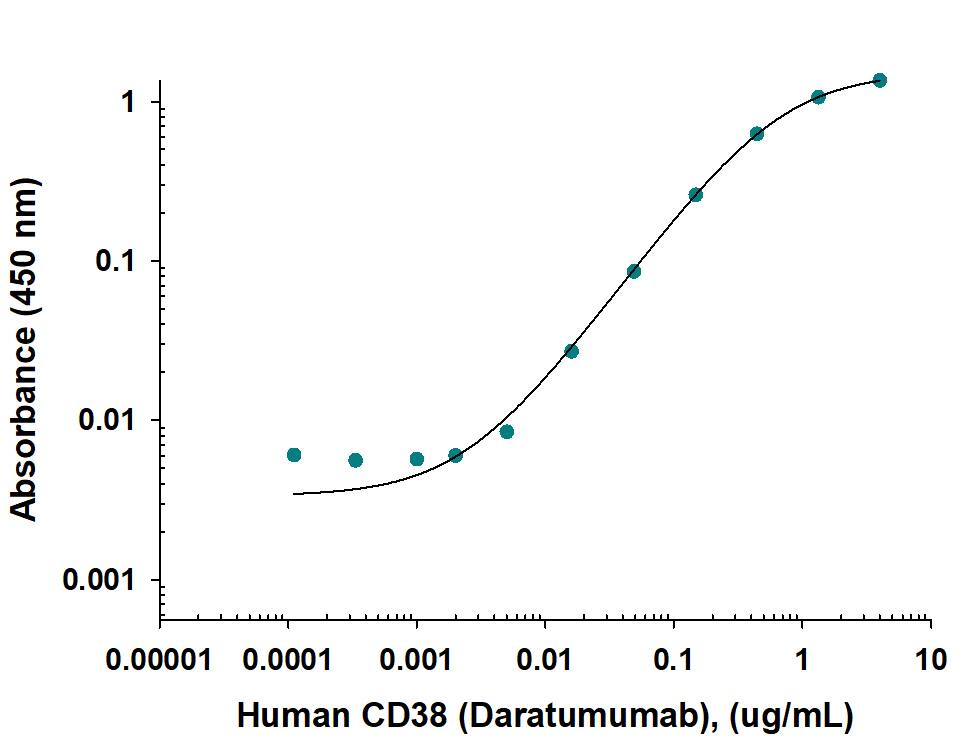Human CD38 (Research Grade Daratumumab Biosimilar) Antibody
R&D Systems, part of Bio-Techne | Catalog # MAB11493
Recombinant Monoclonal Antibody For Research Use Only

Key Product Details
Species Reactivity
Human
Applications
ELISA
Label
Unconjugated
Antibody Source
Recombinant Monoclonal Human IgG1 Clone # Hu208
Product Specifications
Immunogen
NS0 mouse myeloma cell line transfected with human CD38
Met1-Ile300
Accession # P28907
Met1-Ile300
Accession # P28907
Specificity
Detects human CD38 in direct ELISAs.
Clonality
Monoclonal
Host
Human
Isotype
IgG1
Scientific Data Images for Human CD38 (Research Grade Daratumumab Biosimilar) Antibody
Human CD38 ELISA Standard Curve
Direct ELISA binding curve demonstrating the recognition of Human Anti-Human CD38 (Research Grade Daratumumab Biosimilar) Monoclonal Antibody (Catalog # MAB11493) to CD38. The target protein was coated onto the microplate well surface, followed by binding of the antibody. A goat anti-human HRP conjugate was used for detection.Applications for Human CD38 (Research Grade Daratumumab Biosimilar) Antibody
Application
Recommended Usage
ELISA
This antibody functions as an ELISA detection antibody for the specific antigen in direct ELISA. Colorimetric detection is performed after addition of a suitable substrate.
Formulation, Preparation, and Storage
Purification
Protein A or G purified from hybridoma culture supernatant
Reconstitution
Reconstitute at 0.5 mg/mL in sterile PBS. For liquid material, refer to CoA for concentration.
Formulation
Lyophilized from a 0.2 μm filtered solution in PBS with Trehalose. See Certificate of Analysis for details.
*Small pack size (-SP) is supplied either lyophilized or as a 0.2 µm filtered solution in PBS.
*Small pack size (-SP) is supplied either lyophilized or as a 0.2 µm filtered solution in PBS.
Shipping
Lyophilized product is shipped at ambient temperature. Liquid small pack size (-SP) is shipped with polar packs. Upon receipt, store immediately at the temperature recommended below.
Stability & Storage
Use a manual defrost freezer and avoid repeated freeze-thaw cycles.
- 12 months from date of receipt, -20 to -70 °C as supplied.
- 1 month, 2 to 8 °C under sterile conditions after reconstitution.
- 6 months, -20 to -70 °C under sterile conditions after reconstitution.
Background: CD38
References
- Schuber, F. and F.E. Lund (2004) Curr. Mol. Med. 4:249.
- Jackson, D.G. and J.I. Bell (1990) J. Immunol. 144:2811.
- Sun, L. et al. (1999) J. Cell Biol. 146:1161.
- Partida-Sanchez, S. et al. (2001) Nature Med. 7:1209.
- Kato, I. et al. (1995) J. Biol. Chem. 270:30045.
Long Name
Cluster of Differentiation 38
Alternate Names
ADP-ribosyl Cyclase, CD38, Cyclic ADP-ribose Hydrolase
Gene Symbol
CD38
UniProt
Additional CD38 Products
Product Documents for Human CD38 (Research Grade Daratumumab Biosimilar) Antibody
Product Specific Notices for Human CD38 (Research Grade Daratumumab Biosimilar) Antibody
For research use only
